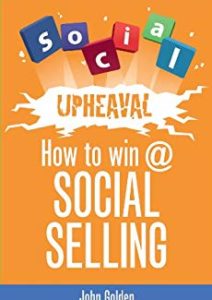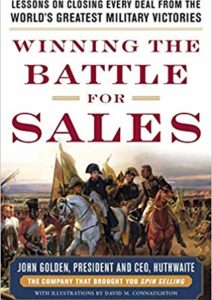Condensed from a Pipeliner SalesChat Interview with Andy Gole
Interview by John Golden
Andy Gole has taught selling skills for over 20 years to over 90 clients in a variety of different industries and market conditions. He started 3 different businesses—a sales agency, a product company, and a consulting company—and has made over 4,000 sales calls, both B2B and B2C. He created his own selling process, called Urgency Based Selling, from his field experience, and has taught selling skills at the Fairleigh Dickinson University Rothman Institution for Entrepreneurial Studies for 8 years.
Recently Andy was our special guest on Pipeliner SalesChats, and gave us some amazing insight into how to bring about entrepreneurial sales management.
Q: Most people don’t normally put “entrepreneurial” and “sales manager” together. What do you actually mean by the entrepreneurial sales manager?
A: The entrepreneurial sales manager is a master of change. He or she can help change the sales force and help change what they do in the field.
We say that there are 4 stages of sales management evolution:
- The first stage is anarchy where nothing is going on.
- The second stage is the motivational sales manager who treats each salesperson like he or she is a customer, and there’s really not much management going on.
- The third stage is the rigorous sales manager. What you see in this stage is a manager who is focused on P&L, CRM, and someone who would actually fire salespeople.
- The fourth stage is entrepreneurial sales management. That’s the stage where we can effectively develop and change our sales team to get entrepreneurial results, to open more new accounts.
So that’s what I mean by the entrepreneurial sales manager: Somebody who can change the sales team.
Q: I personally believe that a sales manager can be the greatest revenue multiplier in an organization. Why are sales managers struggling so much? And why aren’t they becoming the revenue multipliers that they could be?
A: I think the biggest problem is unrealistic or unfulfilled expectations.
I think ownership and top management is looking for what I have called an entrepreneurial sales manager—somebody who is a master of change. But very often we hire somebody who doesn’t have the full gamut of needed skill sets.
When they don’t, it’s top management’s job to bring it into the organization in another way.
Q: If I want to create an entrepreneurial sales management culture, what are some of the first steps I need to take?
A: What we would really like to hire are entrepreneurs, but they’re in short supply. According to statistics, most are either employed or running their own businesses. There’s just not a lot of free-agent entrepreneurs to go around.
What I have found in my work over the last 20+ years is that there’s another player in the marketplace which we call a hybrid entrepreneur. This is a person who has many or most of the entrepreneurial qualities but needs support. So in my experience, 70 to 80 percent of the average sales team are hybrid entrepreneurs.
Q: So what do they need to be able to get entrepreneurial outcomes?
A: First we need to establish a culture in which bold sales behavior is viewed heroically: going out and facing the unknown, taking the hits, taking the adversity.
Next, we need very powerful selling tools that put the bold vision out there. At the same time, the selling tools have to include a proving kit, because most of the buyers are risk-averse, and we need to arm our sales teams to make what you might call the less risky sale. So there’s yin-yang, an oscillation. First, we’re bold, to get into the new opportunity, but then we have to show that we’re safe. The tools have to express this.
So once we have the culture, and we have the right selling tools, now we need a powerful selling system that’s geared to resolving what we call the 3 fatal flaws in selling. From studying over a dozen different selling systems, I’ve noticed 3 consistent flaws, any one of which will destroy business development.
- The first is assuming you’re in a serious conversation. There are 2 kinds of conversations in selling—safe and serious. In a safe conversation, you’re kind of a chump. You’re more or less being brought in as a price check. In a serious conversation, the prospect has a compelling need, and they’re willing to discuss it with you.
- The second fatal flaw is assuming the prospect believes what you say. Reliably, in business development, they don’t believe anything you say.
- The third fatal flaw is assuming that the prospect knows how to make a good decision. Typically the prospect does not and, particularly, for the infrequent purchase.
So what we need is a very powerful standard sales call—a step-by-step procedure that resolves the 3 fatal flaws. We want to have a standard selling product out there, just like we have a standard product or a standard service.
Q: A lot of salespeople are risk-averse, even though they’re in the riskiest profession, but they have to learn to be bold. How do you get over that?
A: There are 3 exercises we use to transform behavior.
I’ll start with what I think might be the easiest—it’s the sales evaluation grid. It’s based on an idea that’s been popularized by Alan Mulally, ex-CEO of Ford Motor Company. You put your KPIs along the side of a paper, and then each salesperson self-evaluates: green means they’re doing a great job, yellow maybe not so great but they have a plan, and red’s a train wreck.
In sales meetings where we put up each of these on a slide and we see how everybody’s doing, The people who are doing it really well coach those that aren’t. Then in the following week, we have 1-to-1 coaching where we really zone in on the areas that need improvement.
The second idea is the battle plan. We have a 2-page battleplan that kind of synopsizes all the key principles of Urgency-Based Selling. When an opportunity is important enough, we have salespeople fill out the battle plan, and we pick something where there’s a challenge, and then we share the battle plans in a group meeting, everybody reads it, and then we discuss it.
The third method, which I think is the strongest but it’s the hardest, is that we diagnose sales calls just like you used to diagram the English grammar of a sentence in the 7th or 8th grade. We have sales team members diagnose each step of the sales call, present it to their peers, and then we discuss the case.
In all of these 3 methods, we’re constantly bringing out the best practices of the team, and trying to make it the practice for everybody. And when we do a program like this, which goes on for 4 to 6 months, we keep on increasing the skill and competency level week after week.
So these are 3 tools that you could use to change the culture.
Q: Great, thank you! How can people get in touch to learn more about your selling system the entrepreneurial sales manager?
A: By all means, feel free to contact me at any of these methods:
Website: urgencybasedselling.net
Email: andy@urgencybasedselling.net
Phone: 732-563-2700











